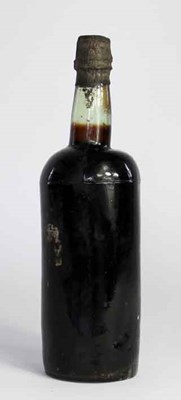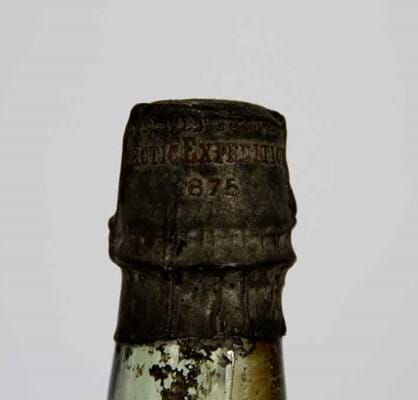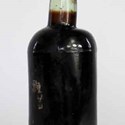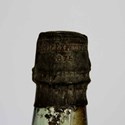Er, no. We are actually talking about beer. And a very interesting bottle of beer at that. Shropshire auctioneers Trevanion & Dean have sold a brew produced for the British Arctic Expedition sent to reach the North Pole in 1875.
After attracting international interest, internet and phone bidders battled it out at the Shropshire saleroom on June 13 until the bottle was eventually secured by a UK phone bidder for £3300 (plus 17.5% buyer's premium).
It was discovered in a box in a garage in Gobowen, Shropshire, by Aaron Dean, auctioneer and partner at the firm. He says: "I noticed the bottle poking out of the top of a box in the garage. The shape of the bottle is unusual and so immediately my mind started whirring. It wasn't until I got up close to it that I realised how historically significant it is.
"After extensive research I found another example which sold in 2004 for £1200. The market has changed dramatically and so I was conservative with an auction estimate of £400-600."
The sealed bottle top is marked Arctic Expedition 1875.
The 1875 voyage by HMS Alert and HMS Discovery, under the leadership of Vice-Admiral Sir George Nares (1831-1915), failed to reach the North Pole but succeeded in mapping the coast lines of Greenland and Ellesmere Island. Dean says: "This may explain why the ale remained undrunk - if their mission had been successful and celebrations were had, we may not be looking at the piece today."
Will the buyer be drinking the ale?
"I doubt it; part of the appeal of the piece is that it has remained unopened for so long, although some have been drunk and tasters report that it was 'sweet tasting with a hint of tobacco'."
Nares, in taking both ships successfully north through the channel between both land masses, became the first explorer to do so and the stretch was named 'Nares Strait' in his honour.
The Story of Arctic Ale
In a 2011 online article, beer writer Roger Protz shed light on the origins of Allsopp's Arctic Ale, "brewed not by Bass but by its major 19th century rival in Burton, Samuel Allsopp".
• After the Franklin expedition to find the Northwest Passage disappeared in 1845, various search parties were sent out to find out what happened, urged on by Queen Victoria. Protz said: "Along with the Admiralty, the queen asked brewers in Burton, famous for their strong beers exported round the world, to create a 'life-sustaining ale' - vitamin B helps prevent scurvy - to supply five ships commanded by Sir Edward Belcher. He led an expedition in 1851 to find any clues to what had happened to the Franklin mission. Bass, Salt, Truman and Worthington competed to produce the beer but the contract was awarded to Allsopp's."
• Four of Belcher's ships ended up trapped in the ice and he had to abandon the expedition. "Two bottles of Arctic Ale from 1851 exist but are in the US," Protz added. "In 1857 Allsopp's again brewed Arctic Ale for a second search for Franklin led by Sir Leopold McClintock. He was also unsuccessful and, as far as anyone knows, no bottles of beer from that year exist." Arctic Ale was brewed again for that 1875 North Pole expedition.
• "Allsopp's merged in 1935 with the neighbouring Ind Coope brewery, which later became part of the Allied Breweries group. When Allied left brewing, the former Allsopp's brewery was turned into the offices of Punch Taverns and passed to the Spirit Group. When the cellars were inspected last year [2010], dozens of bottles of old beer were discovered, including some samples of Arctic Ale from 1875."
• Protz opened one of the bottles. What does a 140-year-old Arctic Ale taste like? He said: "It was dark amber in colour and had an astonishingly complex aroma of dry chocolate, cocoa powder, molasses and vinous fruit. The palate offered creamy malt, sweet fruit and further chocolate and cocoa hints, followed by a bittersweet finish with dark fruit, rich malt and light hops."











